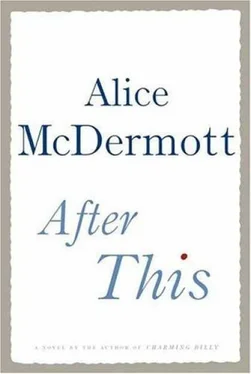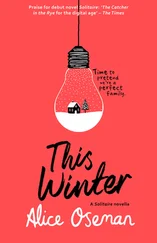Alice McDermott - After This
Здесь есть возможность читать онлайн «Alice McDermott - After This» весь текст электронной книги совершенно бесплатно (целиком полную версию без сокращений). В некоторых случаях можно слушать аудио, скачать через торрент в формате fb2 и присутствует краткое содержание. Жанр: Современная проза, на английском языке. Описание произведения, (предисловие) а так же отзывы посетителей доступны на портале библиотеки ЛибКат.
- Название:After This
- Автор:
- Жанр:
- Год:неизвестен
- ISBN:нет данных
- Рейтинг книги:4 / 5. Голосов: 1
-
Избранное:Добавить в избранное
- Отзывы:
-
Ваша оценка:
After This: краткое содержание, описание и аннотация
Предлагаем к чтению аннотацию, описание, краткое содержание или предисловие (зависит от того, что написал сам автор книги «After This»). Если вы не нашли необходимую информацию о книге — напишите в комментариях, мы постараемся отыскать её.
Most fictional family sagas contain a lot of what could be called plain reporting: answers to the questions (who? what? when? where? why?) that are the basic stuff of journalism. But in her family dramas, McDermott has largely refused to provide a helpful framework of dates, genealogies or factual background. Instead, she has focused on the shifting inner lives of her characters, confident that God – or the larger picture – will be found in the details.
The opening of her latest novel, "After This," demonstrates McDermott's technique at its most elliptical and effective. On a blustery April day in Midtown Manhattan, Mary (no last name given) leaves a church (almost certainly St. Patrick's Cathedral) after lighting a candle, as she has done throughout the war, even though the fighting is over. (Since the war in question is clearly World War II, the action must take place, at the earliest, in the spring of 1946). Mary has also prayed: "She was 30, with no husband in sight. A good job, an aging father, a bachelor brother, a few nice friends. At least, she had asked – so humbly, so earnestly, so seriously – let me be content." Outside the church, squinting in the sunlight, Mary meets a friend of her brother's, who unexpectedly asks her to dinner. "At a restaurant," he explains, when she seems confused. "The two of us." Mary agrees, they part, and she goes into Schrafft's for what's left of her lunch hour.
At the counter she exchanges small talk about the weather with a man seated next to her. "Reminds me of some days we had overseas," he says, standing up to pay his bill. Mary watches him walk away: "And here, of all things, was desire again. (She could have put the palm of her hand to the front of his white shirt.)" Mary returns to her office and later goes home to a walk-up apartment in an unnamed borough to prepare lamb chops for her father and brother before her dinner date, which passes pleasantly and ends with a chaste kiss. The next day, when she returns to Schrafft's, the man she met the day before is waiting outside. Reader, she marries him.
This sequence could stand alone as a classic short story in the Joycean, epiphanic mode: an accretion of humdrum moments that gather force and blossom into the transfiguration of a life. Yet such stories seldom cry out for a sequel – does anyone want to know what Gabriel and Gretta Conroy said to each other the morning after "The Dead" concludes? – and McDermott's deft, delicate beginning is a hard act to follow. Mary, so vivid in her first appearance, rapidly fades into careworn motherhood. Fewer than a dozen pages later, she and her husband, John Keane, are taking a rare break from Sunday Mass at a Long Island beach, deserted after the Labor Day weekend, with their three children. John seems stunned by his responsibilities; Mary's pregnancy will only add to them. A hurricane is beginning to churn up the Eastern Seaboard, and the stinging, wind-borne sand drives the family back home. That night, a tree in the Keanes' yard is blown over. The next morning, a neighbor with a chain saw, who also happens to be a registered nurse, appears just in time to help Mary deliver her baby.
Once this hectic episode concludes, McDermott's narrative turns episodic and digressive, and "After This" begins to resemble a photo album with many missing snapshots and pages. Here is John serving on the building committee of St. Gabriel's Parish, helping raise money for a new church and gym. Over there are Mary and her daughter standing in line to see Michelangelo's Pietà in the Vatican pavillion at the 1964 World's Fair. (McDermott, characteristically, omits the 1964 part, leaving that for her readers to deduce.) Here we see the neighbor's teenage daughter going into Manhattan for an abortion, accompanied by the older of the two Keane daughters, who reads "A Farewell to Arms" in the waiting room. And up ahead, Pauline, Mary's old friend from her office days and the Keane family's honorary spinster aunt, is injured in a fall. Strangely, Pauline's mishap and its aftereffects receive far more attention than the major tragedy that befalls Mary and John, registered almost subliminally and barely referred to again.
Each of the Keane children shines briefly before disappearing. Shy, awkward Jacob drops out of St. John's after a year of poor grades and draws an unlucky lottery number for the Vietnam draft. Michael, charming and irreverent, spends most of his time at his upstate college in a seedy saloon. Annie, the bookish child (inspired by one of Pauline's visits to escape into a Faulkner novel while thinking about "the odor of aging female flesh"), goes to study in England and changes her plans because of a young man she meets on a bus. Clare, devoted youngest child and just as devoted Catholic, nonetheless finds a way to break her parents' hearts.
This assembly of splintered stories suggests that McDermott, like Virginia Woolf in "The Waves," has come to care less about her individual characters than about the unseen forces – fate, the zeitgeist, the inexorable progress of time – that shape and trace the patterns of their lives. With no warning or explanation, she provides capsule previews of the deaths of two family members that are jarring not just because they deflate suspense but because they suggest that it's futile to invest much interest in these characters.
Late in the novel, Clare Keane, having finally found a boyfriend during the long summer vacation, returns to her Catholic high school displaying new aplomb and self-confidence: "Of course of course, the teachers, even the nuns told each other, indulgent and naïve. Those who had been at the school when Annie was a student said, with a shrug, Life goes on." And that seems to be the burden and the message of "After This." Life does, irrefutably, go on. But if that's all there is to say about the matter, why bother with art and stories, which defy the limits of birth and death by trying to immortalize the interesting things that happen in between? For all its page-by-page brilliance, "After This" leaves that question hanging.













